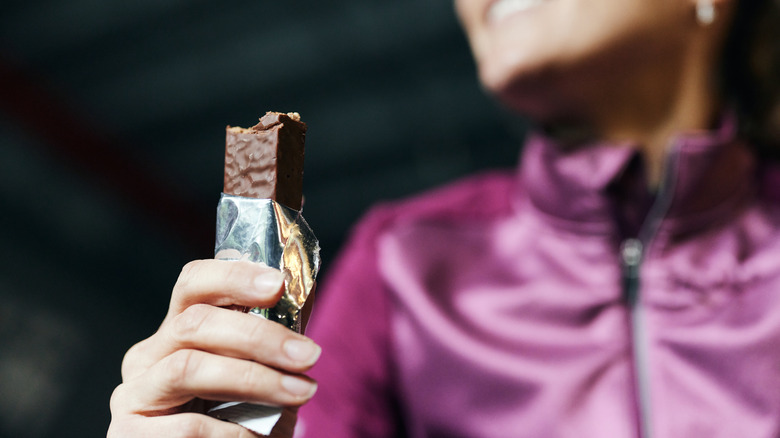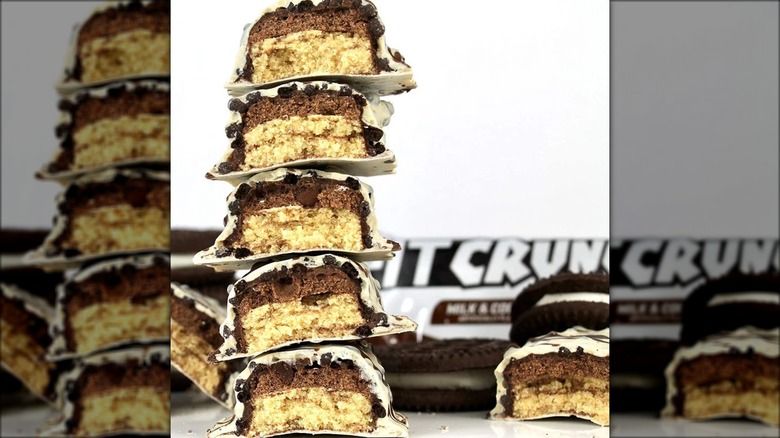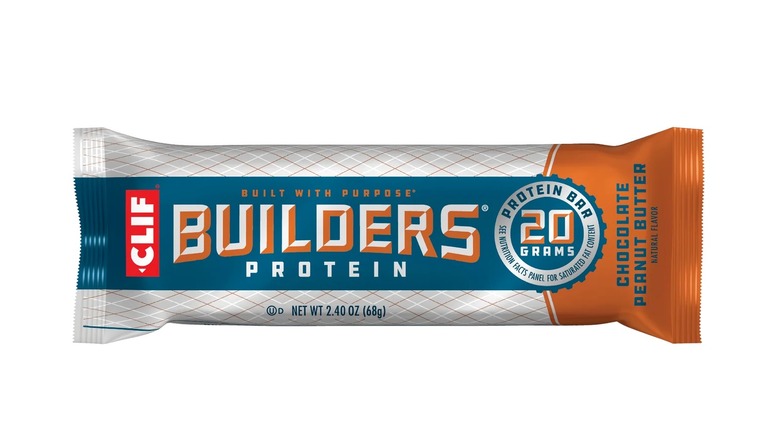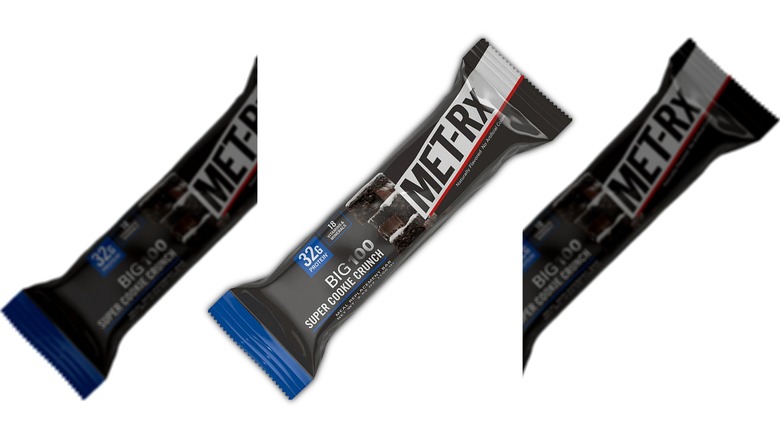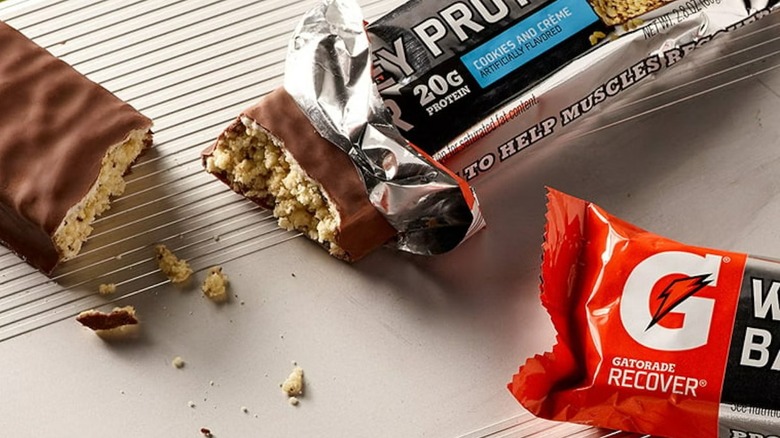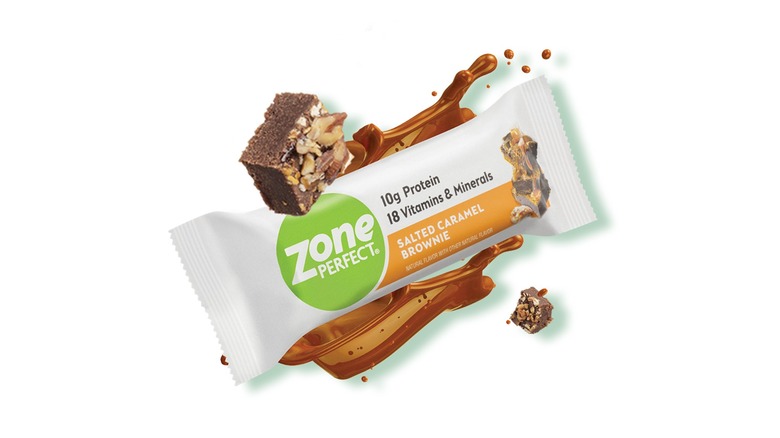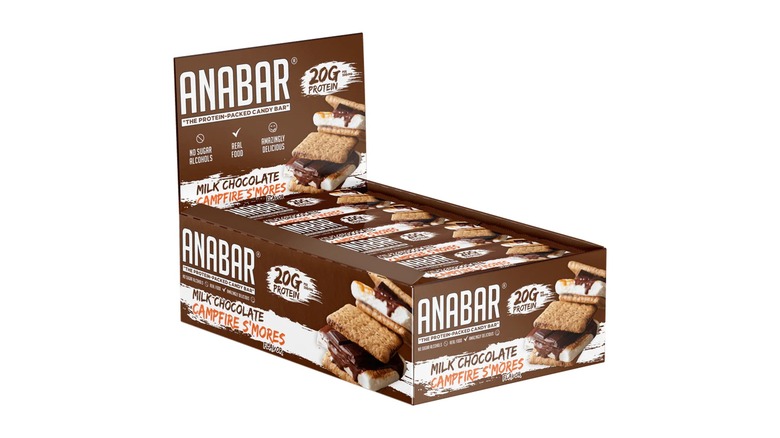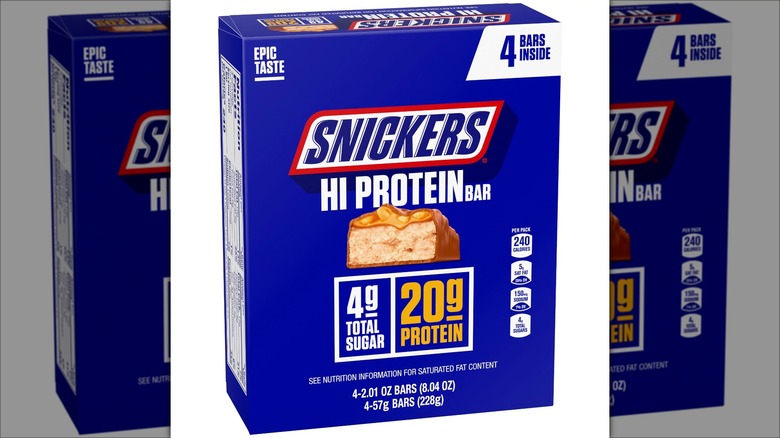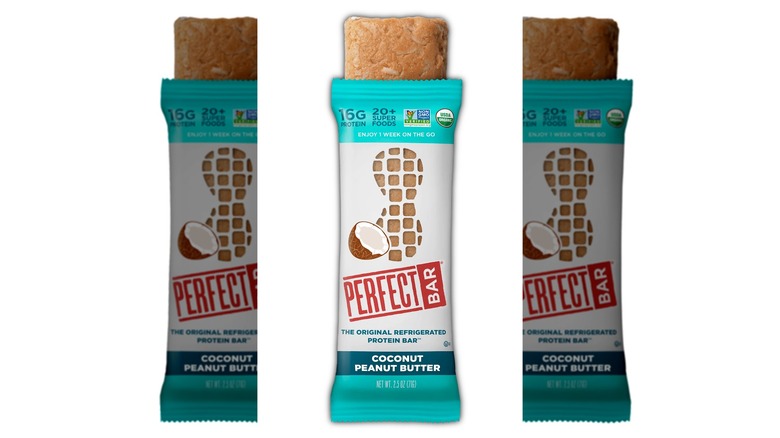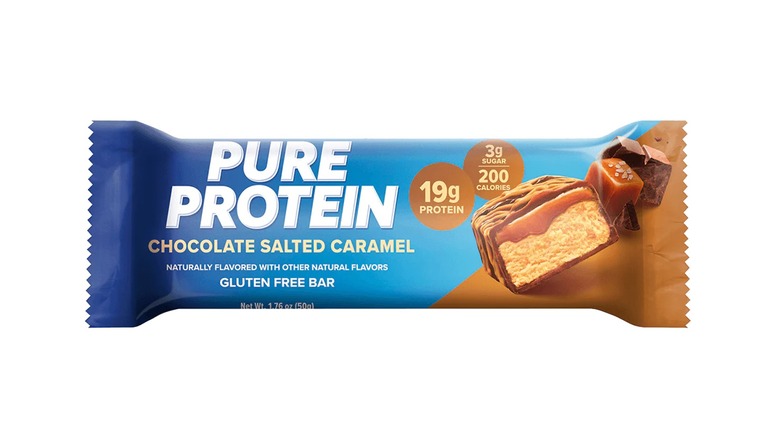12 Unhealthiest Store-Bought Protein Bars
We may receive a commission on purchases made from links.
Protein bars are big business in North America with some estimates from market researchers like Mordor Intelligence valuing it at over $6 billion. As it continues to grow, the industry is coming under ever increasing scrutiny from nutritionists who claim protein's association with all aspects of fitness conceals that many of these products are candy bars in disguise. In an interview with The New York Times, professor of nutritional anthropology Janet Chrzan summarized it perfectly, saying, "You can put 'keto' or 'protein' on a candy bar and sell it, and people don't even question it." In this article, we highlight just how true this statement is by examining 12 of the unhealthiest store-bought protein bars out there.
As with all well-marketed products, protein bars place their supposed benefits front and center. In these products' case, it's the huge quantities of protein they contain. What those producing them often fail to mention is that many protein bars are also packed full of saturated fat and added sugars. These are two red flags for anyone seeking a healthy snack as the overconsumption of both has been linked with a variety of illnesses including cardiovascular disease. The following 12 protein bars demonstrate just how much added sugars and saturated fats these products can contain. Be warned, it's a considerable amount.
FITCRUNCH Milk & Cookies
Robert Irvine is a British celebrity chef who has appeared on many Food Network shows including "Dinner: Impossible", "Chopped: Impossible", and "Worst Cooks in America". Irvine is known for his large, well-muscled physique, so it's no surprise that Irvine has launched his own brand of protein bars, FITCRUNCH.
FITCRUNCH sells a variety of products, including several different types of protein bars. While it cannot be said that any of these are particularly healthy, FITCRUNCH Milk & Cookies is especially unwholesome. That's because a single 88 gram bar contains 15 grams of saturated fat, amounting to 75% of an adult's daily value. This is a staggering amount to be contained in a single bar. For perspective, FITCRUNCH Milk & Cookies contains four more grams of saturated fat than a McDonald's double cheeseburger. According to Harvard Health Publishing, diets high in saturated fat have been shown to cause cholesterol levels to rise and may contribute to arteries becoming blocked, potentially leading to heart attacks. For this reason, FITCRUNCH Milk & Cookies is a definite feature in this article.
While the product's saturated fat content is the main reason it features on this list, it is not the only one. FITCRUNCH Milk & Cookies also contains a substantial amount of added sugars: 8 grams per bar. This is 16% of an adult's daily value. While not an enormous amount, it is by no means negligible.
Kellogg's Special K Chocolate Peanut Butter Chewy Protein Meal Bars
So lucrative is the protein bar industry that several major food companies have released products of their own. Kellogg's, producer of the now discontinued Yogos, is one of these, boasting a range of Special K protein bars that it markets as a great addition to a busy person's diet. Despite these claims, and Special K's reputation as a healthy brand, these protein bars are decidedly unhealthy.
Amongst the most unhealthy Special K protein bars is Kellogg's Special K Chocolate Peanut Butter Chew Protein Meal Bars. One of these 45 gram bars contains six grams of added sugars which amounts to 12% of an adult's daily value as well as 4.5 grams of saturated fat, 23% of an adult's daily value.
Upon first impressions, this protein bar seems considerably healthier than FITCRUNCH Milk & Cookies. While it is true that this Special K bar contains much less saturated fat and added sugars, it must be remembered that this bar is half the size of the FITCRUNCH bar. When compared on a gram-per-gram basis, the bars have much more similar nutrition profiles. As a result, Special K Chocolate Peanut Butter Chew Protein Meal Bars are anything but healthy.
Clif Builders Chocolate Peanut Butter Flavor Protein Bar
Despite a few instances where Clif bars have been recalled, Clif has been available and popular since the 1990s. The company first started using organic ingredients in 2003 and has made a point of using non-genetically modified ingredients in its bars. Despite these steps, protein bars including Clif Builders Chocolate Peanut Butter Flavor Protein Bar cannot be deemed healthy due to the vast amounts of added sugars and saturated fat that they contain.
This particular protein bar weighs 68 grams and contains 6 grams of saturated fat which is 29% of an adult's daily value. This is a considerable amount that, if eaten regularly, could lead to weight gain and the raising of cholesterol levels. Clif Builders Chocolate Peanut Butter Flavor Protein Bar also contains 17 grams of added sugars which is 33% of an adult's daily recommended value.
To the brand's credit, Clif does not use high fructose corn syrup, a particularly harmful source of sugar. However, 17 grams is a considerable amount of sugar that makes classifying this protein bar as unhealthy a simple choice.
Great Value Chewy Protein Granola Bar
Walmart's Great Value brand sells a variety of private label products that often outperform their name brand competitors. When it comes to protein bars, Great Value repeats this pattern with its Chewy Protein Granola Bars being a big hit amongst Walmart customers. These individuals celebrate the protein bar's taste, price, and nutritional profile.
Great Value Chewy Protein Granola Bars are not the healthiest snack out there. Each snack-sized, 40 gram protein bar contains 3.5 grams of saturated fats and five grams of added sugars. These are 18% and 10% of an adult's daily value respectively. These values are much lower than those found in several other protein bars meaning that Great Value Chewy Protein Granola Bars are one of the healthier options in this article. However, they are also much smaller than many of the other products. On a gram-by-gram basis the differences between them are much smaller, meaning they more than deserve their spot on our list.
MET-Rx Big 100 Super Cookie Crunch
The original MET-Rx formula was created by Dr. Scott Connelly as a means of ensuring patients could gain or maintain weight when critically ill. It was not long until MET-Rx was being used by both athletes and bodybuilders who were eager to put on mass. Over the years, the brand has become immensely popular in these sporty fields and it now produces a variety of products, including protein bars.
Weighing 100 grams, MET-Rx's Big 100 Super Cookie Crunch is the biggest protein bar included in this article. Given its large size, it is impressive that the protein bar only contains six grams of saturated fat. However, MET-Rx Big 100 Super Cookie Crunch also contains 24 grams of added sugar, nearly half of an adult's daily value.
In all fairness, this protein bar is marketed as a meal replacement product and should not be eaten in the same way that many other protein bars are. That being said, due to the high amounts of added sugar it contains, this protein bar cannot be considered healthy.
Kind Dark Chocolate Nut Protein Bar
Kind is a company that prides itself on producing healthy snacks. Since 2018, this range has included several different protein bars. Many of these are low in sodium, boast a low glycemic index, and are not made with genetically modified ingredients.
As the name suggests, Kind's Dark Chocolate Nut Protein Bar is predominantly made of nuts, most notably peanuts and almonds. Due to the prevalence of nuts, and other ingredients including palm kernel oil, Kind Dark Chocolate Nut Protein Bar contains a large amount of saturated fat, four grams per every 50 gram bar. This is 20% of an adult's daily value, a considerable amount that brings into question the bar's healthy credentials.
Kind's Dark Chocolate Nut Protein Bar also contains six grams of added sugars. This is 12% of an adult's daily value. While not a huge amount, it's worth remembering that there are many other protein bars that contain considerably less added sugar.
Gatorade Protein Bar Cookies and Creme
Gatorade is a brand synonymous with sport, especially college football. Given the brand's dominance in the sport and exercise market, it's no surprise that Gatorade has its own range of protein bars, each of which boasts an impressive 20 grams of protein. While these bars contain a great deal of protein, they cannot be deemed healthy due to the high amounts of saturated fat and added sugars they contain.
Gatorade's Cookies and Creme protein bar, which weighs 80 grams, contains 10 grams of saturated fat. This is just under half of an adult's daily value and one gram more than the amount found in a McDonald's McDouble. This protein bar is also packed with added sugars, 29 grams to be exact. Aside from being the largest amount of sugar of any protein bar on this list, this amount also constitutes 58% of an adult's daily value. This is an astonishing amount to be found in a single, 80 gram snack. To put it simply, Gatorade's Cookies and Creme bar contains more added sugar than a Snickers bar. While it does contain a lot of protein, that isn't enough to move the bar into healthy territory.
ZonePerfect Classic Bar Salted Caramel Brownie
ZonePerfect is a brand owned by Abbott Nutrition, a company that claims to produce science-based nutrition products. Despite these claims, the brand was known to sell a variety of bars packed with sugar, one example being the Salted Caramel Brownie Classic Bar.
One of these 45 gram protein bars contains five grams of saturated fat, which is a quarter of an adult's daily value, and 14 grams of added sugars, 29% of an adult's daily value. These are huge quantities to be found in a bar that small. Gram-for-gram, the sugar content of this bar is not far below that of the aforementioned Gatorade bar. This high sugar content has been noticed by customers, many of whom have complained about the bar's overly sweet taste.
Given the bar's unhealthy nutritional profile and poor quality taste, it's no surprise that Abbott Nutrition decided to discontinue the protein bars in March 2024. It's important to note, however, that these unhealthy, substandard bars are still available to purchase across the United States. We'd recommend avoiding them.
Anabar Campfire S'mores
Anabar was launched in March 2021. The company grew rapidly, selling more than 5 million bars in two years and launching a variety of flavors. Marketed as the best tasting protein bars, Anabar flavors lean decidedly sweet and include Anabar's Campfire S'mores, a 65 gram protein bar that, like any classic s'more, contains marshmallows and graham crackers.
Every Anabar Campfire S'mores bar contains 4 grams of saturated fat. This is a fifth of an adult's daily value, putting it on a par with several other protein bars included in this article. Where this protein bar stands out is in its added sugar content. The bar contains 21 grams of added sugars which is 42% of an adult's daily value. This is only one gram less than found in a KitKat. Such a high added sugar content means that Anabar Campfire S'mores is anything but healthy, regardless of how much protein it contains.
Snickers Hi Protein Original Bar
While many protein bars are accused of being candy bars in disguise, Snickers Hi Protein Original Bar actually is a candy bar in disguise. The chocolate-coated Snickers bar, which was launched in 2022, contains both of Snickers signature ingredients, peanuts and caramel, all while boasting 20 grams of protein per every 57 gram bar.
Aside from its admirable protein content, there is not much that's healthy about Snickers Hi Protein Original Bar. Thanks to the inclusion of both palm oil and palm kernel oil the protein bar contains 5 grams of saturated fat which is a quarter of an adult's daily value. This is actually more than is found in a regular Snickers bar.
Interestingly, Snickers Hi Protein Original Bar only contains minimal amounts of sugar, 3 grams per bar to be exact. This is a whole 23 grams less than a regular Snickers bar. But while Snickers Hi Protein Original Bar might be marginally more healthy than a regular Snickers bar, it is by no means a healthy protein bar in its own right.
Perfect Bar Coconut Peanut Butter
Perfect Bar is a brand of refrigerated protein bars that are made without the use of chemicals or artificial preservatives. The vast majority of ingredients used to make the bars are organic and, as an added benefit, a blend of over 20 superfoods is added to every Perfect Bar product, packing it with nutrients. While these factors make Perfect Bar products healthy in one sense, the high levels of added sugars and saturated fat found in them deem them unhealthy in another.
Perfect Bar's Coconut Peanut Butter protein bar is a prime example. Due to the inclusion of high fat foods such as peanut butter, coconut, and coconut oil, this 71 gram bar contains 6 grams of saturated fat. This is 30% of an adult's daily value. This bar also contains 12 grams of added sugars, just under a quarter of an adult's daily value. With numbers this high, we had no choice but to include Perfect Bar Coconut Peanut Butter in this list.
Pure Protein Chocolate Salted Caramel Protein Bar
Pure Protein is a company that produces and sells a range of protein-laden products. Bars are chief amongst these. Pure Protein bars are generally well-reviewed. Customers enjoy the taste of the bars and think that they boast a good balance of macronutrients. For the most part, this is true. For example, a 50 gram Pure Protein Chocolate Salted Caramel Protein Bar contains 19 grams of protein, and only 2 grams of added sugars.
Pure Protein Chocolate Salted Caramel Protein Bar also contains 4.5 grams of saturated fat. This is 23% of an adult's daily value, the amount found in three large eggs. This reasonably high level of saturated fat likely comes from both the palm kernel oil and palm oil that's used to make the protein bar. Such a high level of saturated fat in such a small bar is why Pure Protein Chocolate Salted Caramel Protein Bar is included in this article.
